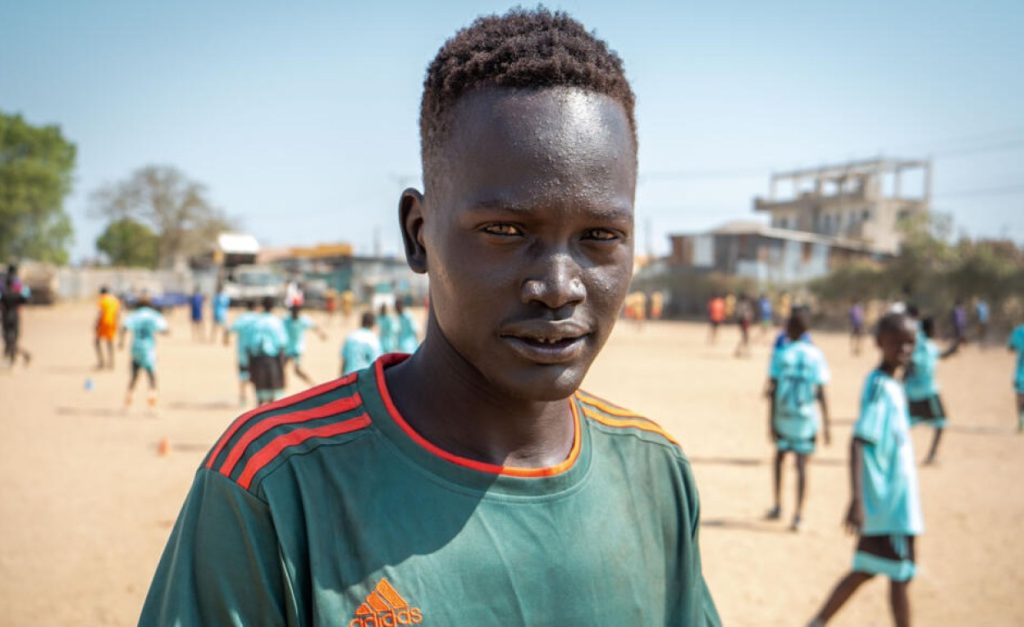South Sudan: The Football Academy Giving South Sudan’s Youth an Alternative to Gang Life

Years of civil war and economic crisis have left young people in South Sudan with a legacy of violence and poverty – and with opportunities scarce, street gangs have flourished. RFI met one former gang member who believes football can offer marginalised youth a brighter future.
On a dusty field in Sherikat, a suburb in the south-east of South Sudan’s capital Juba, children and teenagers practice dribbling balls and weaving between cones. They take turns playing against each other, different coloured jerseys dividing them into teams.
“This is Young Dream Football Academy,” says Alaak Akuei, who everyone calls Kuku. “We are working with young people. Most of them come from the street and some are in gangs.”
Akuei, 24, used to belong to a gang himself. He joined when he was 13 and newly arrived in Juba from a smaller town in the south.
Five years later, after several stints in prison, he set up Young Dream.
“The young men, they don’t have anything to do. That’s why many of them are on the streets and end up in gangs,” he says. “We need to offer them activities to keep them busy and so that they don’t drop out of school. Football can be very powerful to fight this issue of gangs.”
‘Sense of belonging’
Gang crime has become a major concern in Juba and other cities in South Sudan. In one internal displacement camp in the capital alone, the NGO Nonviolent Peaceforce estimates that nearly 1,200 people belonged to gangs in 2021, more than 90 percent of them aged under 18.
Members were accused of crimes including theft, drug dealing, rape and assault.
While many victims are members of rival gangs, outside “civilians” can be caught up too: between 2018 and 2023, the charity says, gang violence reportedly killed 39 people in the camp – 11 of them non-members – and severely injured more than 600.
From civil war to economic chaos: Ten years of independence for South Sudan
Years of insecurity in the country have killed or displaced millions, breaking up communities and disrupting schooling and livelihoods.
Now, the peace deal that ended the 2013-18 civil war looks close to collapse, threatening to tip the country back into conflict.
Meanwhile, widespread corruption and power struggles between political factions have left much of the country struggling to secure food, healthcare, education and other basic services, according to the United Nations Commission on Human Rights in South Sudan.
In the absence of the state, gangs have stepped in. They offer not only a path to profits, but a community.
“Children and youth are looking for a sense of belonging, to be loved. That is the main reason why they join gangs,” believes Sakaya Peter, who works for community empowerment NGO Gredo.
“In these groups, they don’t just fight or steal. They love each other deeply and care for one another.”
For the same reason, he says, initiatives such as the football academy can offer an effective alternative.
“By bringing them together regularly to do sports, we can offer them that same feeling that they have people they can get support from.”
South Sudan’s returnee farmers yearn for peace to revive food production
Second chances
Today Young Dream trains more than 900 young footballers, as well as running other sports programmes, academic support sessions and leadership workshops.
Its six coaches are all former gang members. Emmanuel Aman Malual, 21, sees it as a second chance.
“Back when we were in the gang, we slept on the streets, drank, smoked. We did a lot of bad things. But it is possible to change,” he says. “I am a different person now, and I can’t imagine going back. Now all I want is to help these children, because they are the future of this nation.”
By the side of the pitch, a group of boys stand in the shade of a tin veranda. They were recruited from the streets by Akuei, who is also trying to get them back in touch with their families.
John, 17, left home in 2017. His mother, an alcoholic, could be violent. His ambitions are simple: “I want to play football and go to school, and stay in a nice place where I can sleep, change my clothes and live normally.”
By RFI website.



